QuestionHi there,
I have a 2 year old Blue Russian Mix and he has a bad habit of eating,
swallowing whole anything like string, clothes, hair ties, plastic, you name it,
if it's soft he will swallow it. He is an indoor cat with no other cats and he is
free fed dry food (vet said he should be on wet since he is neutered) He is
free fed to prevent him from eating stuff (doesn't seem to help) He has gone
for two surgeries and 4000.00 later I need help to figure out why he is doing
this and if there is anything to prevent it. We had cat proofed the house and
removed all hair ties and such, but he still seems to find stuff. I think it may
have started from boredom and now may be a bad habit. Have you heard of
this kind of behavior?
Please help. Thanks so much,
Kyla
AnswerKyla,
I'm wondering if your kitty is searching for some roughage in his diet. You may want to try leaving a pot of organic cat grass within reach for your little guy to chew on as he likes. If you don't get much sunlight in your home you could try giving this kitty some cooked and finely minced veggies or even raw, organic baby spinach or lettuce that's been well washed. I have had decent success giving my cats the tiny, tender shoots of romaine lettuce found deep inside of the head, they seem to enjoy that and raw, organic baby spinach is a favorite as well. Other veggies that your cat may or may not be interested in trying include steamed broccoli that's been finely minced or even some cooked squash that's been mashed up with water - you could also try out the baby food version of squash, but you need to make sure that it's the only ingredient in the brand you try because some foods like onions, salt and garlic can cause problems for cats. Some cats also like canned pumpkin (not pumpkin pie mix, cats don't like the spices or sugar). About a tablespoon of veggies each day should do it. Sometimes you can make a difference in "eating habits" like your cat has by switching to a high quality, holistic food made from human grade ingredients such as Wellness. I don't tend to feed Wellness on any kind of regular basis because it's assumed that you will feed dry and canned foods together every day and that can get expensive after awhile. I like feeding a food made by Halo called Spot's Stew Sensitive Cat. This formulation includes turkey and salmon as the main protein sources, it also includes a variety of fruit and veggies that give our cats nutrition that they need, another thing that I like about this food is that it includes friendly bacteria normally found in a mammal's digestive system like lactobacillus and acidophilus. Maybe a change in food and adding some fiber to your little guy's diet will help with this issue. When it comes to a cat's nutritional needs and any questions you may have I think that you might find the site that my vet recommended to me useful. When I spoke with my vet about appropriate nutrition for my cats she recommended that I take some time and stop in at catinfo.org which is a website written by a veterinarian and it answers the big questions about pet food and what a cat's needs are. If you aren't comfortable feeding the diet described on this website a high quality, holistic food made from human grade ingredients is a decent second choice. Initially foods like Spot's Stew may seem expensive, however my 3 resident cats go through a 6 pound bag each month which averages out to 3 months worth of food in a single cat household...For less than the cost of a cup of coffee each day you can feel comfortable about the food your kitty's getting.
It may also be worth investing in some form of entertainment for this kitty. If you own your own home you could put up a squirrel proof bird feeder outside of a window that this kitty sits in fairly often. Cats are predators and they really enjoy watching small song birds and wildlife like squirrels, mice, etc. If you don't own your home and you spent a lot of time away from home you could try out things like the Cat Sitter DVDs which cost roughly $15 CAN and feature some great footage of birds and other prey animals. Most cats like to watch it when they're home alone, so provided that you remove any breakable/sentimental items from the top of the TV and pull up a chair for your buddy to watch his TV show you may find that he really enjoys these movies which may stop the ingestion of foreign objects. It's certainly a good idea to keep string/thread and sharp objects like needles away from a kitty, these common household items can result in very expensive and extensive surgery as I'm sure you're already aware. If this kitty still persists with his appetite for odd things you might find that having the vet do a full pre-anesthetic blood test on your cat could explain what's going on. If your kitty is lacking anything in his diet or that he may be having a medical issue. You may find that taking some time out of your busy day to play with your kitty using interactive toys and leaving toys that he can play with on his own will help. Most cats like to be able to predict their day, if they know that they can count on play time being at a specific time some cats will look forward to it and often enjoy themselves. My sole piece of advice beyond checking the safety of toys that you give your cat before you give them to him is that you should seriously think about what that toy will sound like at 3 am because cats can be incredible experts at keep away with noisy toys when they've woken you at an ungodly hour.
You could also check with a holistic veterinarian about remedies that might stop this expensive and dangerous habit. A holistic vet is trained in conventional medicine as well as one or more alternative therapies like homeopathy, acupuncture or massage. My family vet is a holistic practitioner and she uses homeopathy to complement the conventional medicine and I've gone from being somewhat of a skeptic to being amazed at the results that I've seen in my resident and foster kitties. I've also found that a good way to find a good vet is by word of mouth, if people consistently praise a specific doctor there's a good chance that s/he is good at their job. In the event that a traditional medical approach doesn't work and a holistic approach isn't effective then you can certainly ask for your vet to refer you to a behaviorist specializing in cat behavior. Your vet may also suggest the use of powerful anti-depressant/anxiety drugs. I normally don't recommend these drugs be used as a first line of defense simply because they aren't without risks or side effects, however in this case a prompt solution is needed because the next thing that this kitty eats could be his last. I do recommend that you seriously consider doing the research on the use of anti-depressant drugs in cats and get comfortable with asking about risks and side effects with your veterinarian. Once you know what the risks of drug treatment using psychotropic drugs are then you can make the informed decision whether or not this course of treatment is best for you and your kitty.

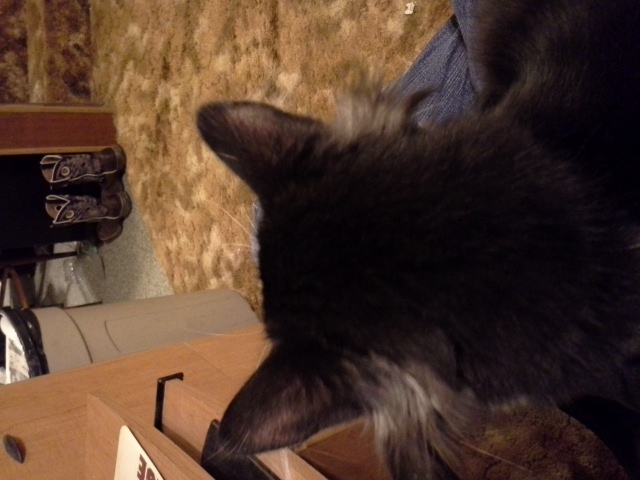 Can you give me an idea for possible cat breed?
Question
Tufts Maverick
My cat Maverick ha
Can you give me an idea for possible cat breed?
Question
Tufts Maverick
My cat Maverick ha
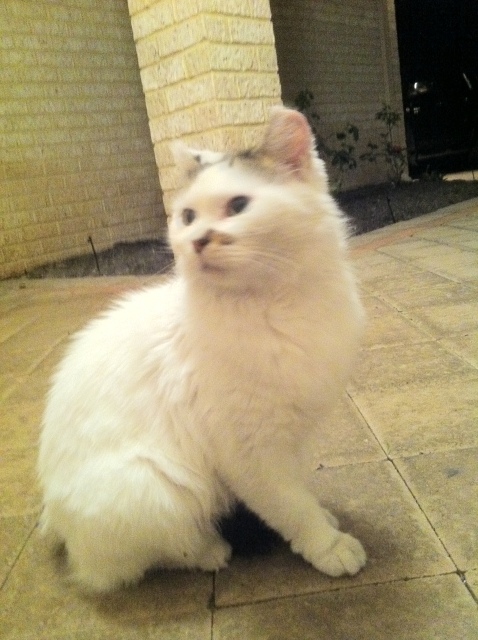 Pregnant cat and her to be kittens.
Question
Scarlett
Recently (May 2011) we adopted a stra
Pregnant cat and her to be kittens.
Question
Scarlett
Recently (May 2011) we adopted a stra
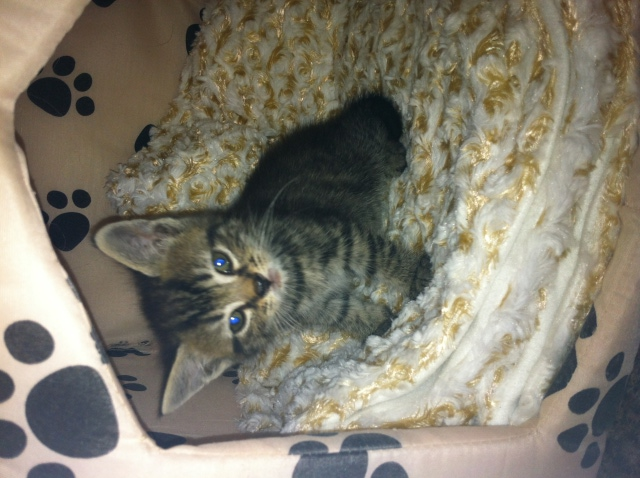 Bengal kitten?
Question
Pic Picture
Hello, I was wonderi
Bengal kitten?
Question
Pic Picture
Hello, I was wonderi
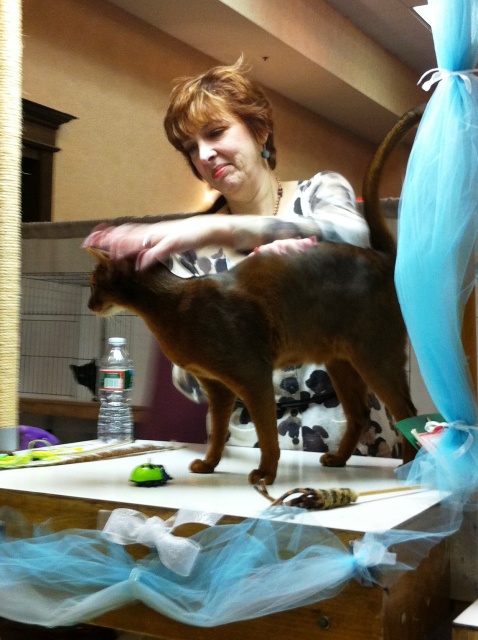 Best weight-loss plan for Abyssinians?
Question
Overweight Aby?
I have a year and 10 month old
Best weight-loss plan for Abyssinians?
Question
Overweight Aby?
I have a year and 10 month old
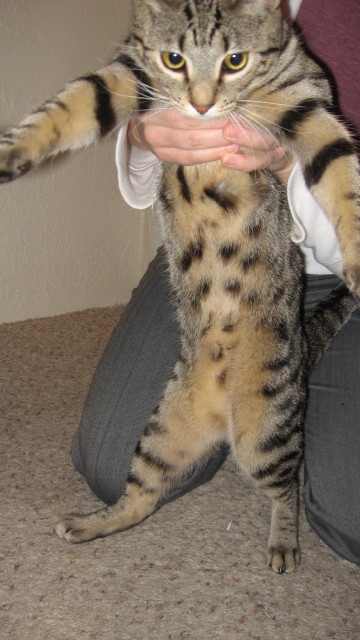 What breed is my cat?
QuestionBoots
QUESTION: Hi Norman, i was hoping
What breed is my cat?
QuestionBoots
QUESTION: Hi Norman, i was hoping